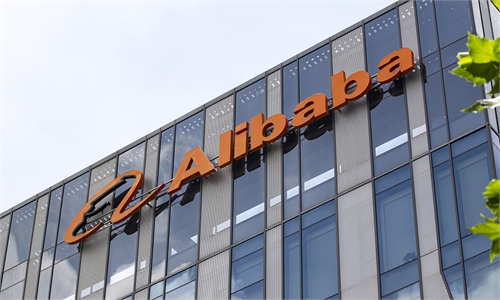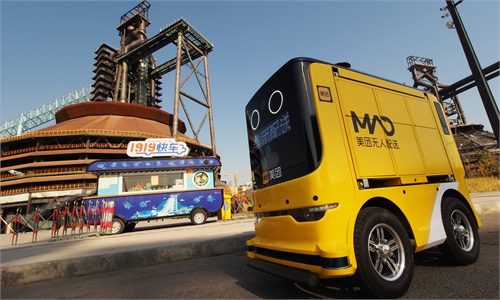Meituan could face serious penalties after antitrust probe: experts
China's crackdown on monopolies widens, labor issues also at stake

A Meituan food delivery driver is seen in Beijing in February. Photo: cnsphoto
China's largest online food delivery platform Meituan is under investigation for suspected monopolistic practices, the country's top market regulator said on Monday - making the company the latest internet giant after Alibaba to face such a probe as China further steps up its crackdown on monopolies.
In a notice, the State Administration for Market Regulation (SAMR) said that it launched an investigation of Meituan for suspected monopolistic practices including forced exclusivity arrangements, known as "choose one of two," for which Alibaba was hit with a record $2.8 billion fine earlier this month.
The SAMR did not provide further information regarding the probe.
"Regardless of the outcome of the investigation, the crackdown is a necessary step in fostering platforms' development in a sound, rapid and sustainable way," Zhang Yi, CEO of iiMedia Research Institute, told the Global Times on Monday.
"The absence of order in the sector's expansion in recent years has created disorder in the market and heightened risks, and this sort of a food-delivery market is unhelpful to the development of the catering industry and consumer experience," Zhang said.
In response to the investigation, Meituan said on Monday that it would actively cooperate with the SAMR and further improve its management in terms of compliance to safeguard users' and other entities' interests. Business operations remain normal, it said.
"The company could face the same kind of penalty as was imposed on Alibaba a few weeks ago, depending on whether the investigation finds the company accountable, and the extent of its violations," Zhang said.
The regulator imposed a record $2.8 billion fine, or 4 percent of its domestic sales revenue in 2019, on Alibaba on April 10 for monopolistic conduct, including abusing its dominant market position and forcing merchants to choose one of two platforms.
Meituan, by comparison, posted revenue of 114.8 billion yuan ($17.7 billion) in 2020, up 17.7 percent year-on-year. Its net profit was 4.71 billion yuan.
However, unlike Alibaba, Meituan's business offers jobs to people with low skill sets and runs on a thin margin, and regulators may factor in those situations, according to Zhang.
Meituan has been investigated and penalized many times before by authorities at the local level in China, and its market capitalization has plummeted this month.
Li Junhui, a professor at the China University of Political Science and Law, said that the issue of "choosing one of two" is rampant in the food delivery business.
Taking previous probes into China's e-commerce platforms as a reference, how regulators define the timeframe when Meituan gained a dominant market position would be crucial to the investigation and its subsequent ruling.
"Without the so-called market dominant position, exclusivity arrangements with catering services providers are deemed to be okay," Li told the Global Times on Monday.
Meituan's market share increased from 60.1 percent in the first quarter of 2018 to 67.3 percent in the first quarter of 2020, data showed. The share held by its smaller rival Ele.me declined over the period from 29.3 percent to 26.9 percent.
Meituan's probe could go beyond its potential monopolistic practices to the company's policies on labor issues, according to Li Yi, a senior research fellow at the Green Digital Development Research Center under the Shanghai Academy of Social Sciences.
Li noted on Monday that the investigation, announced shortly before the Labor Day holiday, offers rich pickings considering the company's notorious treatment of deliverymen in terms of work benefits and other issues.
Roughly 5 million people work on the platform and most of them are laborers with rudimentary skills. As have been widely reported, their social security benefits are not at a satisfactory level due to a complex mechanism the company employs.
"Driven by capital, the platform is running blind, with only profits in mind. That's a systemic risk, if unchecked, for a socialist country, which emphasizes common prosperity," Li told the Global Times on Monday.
Chinese market regulators began to step up their crackdowns on monopolistic behavior and unfair competition in 2020. The probe of Meitian is another step in the SAMR's crackdown on monopolies in the platform economy.
The SAMR on April 13 told 34 platforms including Tencent, Alibaba, Baidu and Meituan to stand in awe of the rules and undertake comprehensive rectification of their monopolistic acts, and tax-related irregularities or violations, within one month.
Liu Weijin, head of the SAMR's certification and supervision department, said on April 15 that the SAMR will enhance its efforts on antitrust investigations to meet merchants' desire for a fair market environment and protect consumers' interests.
Experts noted that the abuse of dominant market positions also exist in other sectors, such as ride-hailing, and more firms could face probes from regulators.




